七年级英语下册 Module7 Unit 3 Language in use 练习题(无答案) 人教新目标版
(新)外研版七年级英语下册Module7 Unit 3 Language in use (共28张PPT)
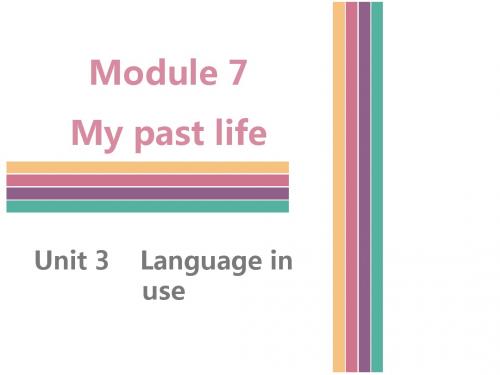
语法探究
7.Who _________ were your first friends? 8.There _________ wasn’t (not) some milk in the bowl yesterday. 9.It _________ hot yesterday and most children was _________ outside. were 10.—Where _________ your brother now? is —He _________ here just now. was
语法探究
( C)8.He got up late this morning.There _________ no time to have breakfast. A.have B.had C.was D.were ( B)9.—Was Ningning born in Yangzhou? —_________.She was born in Nanjing. A.Yes,she was B.No,she wasn’t C.Yes,she wasn’t D.No,she was ( D)10.—When _________ Jay Chou born? —He _________ born _________ 18th July,1980. A.was;were;in B.were;was;in C.were;was;on D.was;was;on
语法探究
They were at school last Tuesday.上周二他们在学 校。 动词be的一般过去时的常见句式有: 1.肯定句:主语+was/were+其他 They were at home last night.昨晚他们在家。 2.否定句:主语+was not (wasn’t)/were not (weren’t)+其他 I was not (=wasn’t) here yesterday.昨天我不在这 儿。 My parents were not (=weren’t) at home last Sunday.上周日我父母不在家。
七年级英语下册Module7MypastlifeUnit3Languageinuse教案新版外研版

Unit 3 Language in use课题Module 7 My past life 第三课时Unit 3 Language in use 课型Revision教学目标知识目标1.复习并掌握以下词汇:yesterday, born, strict, friendly, primary school, town, US,village, nice, good, difficult, bathroom, bedroom, garden...2.掌握以下句型:①I was born in Quincy.② My first teacher was Mrs Lane.③I wasn’t born in Quincy.④—Were you difficult in class too?—No, I wasn’t.⑤Where were you born?能力目标能够用动词be的过去式描述自己和他人过去的生活或经历情感目标通过对过去童年或家乡的描述,产生对家乡和美好生活的热爱教学重点1.Grasp the words and the expressions in this module2.Grasp how to describe one’s own and others’ past life教学难点1.Grasp the past tense form of the irregular verbs2.Describe one’s own and other’s past life课前预习Preview the new words教学方法Situational approach; Listening and speaking approach;Communicative approach教学过程教学环节教师活动学生活动备课札记Step 1 Revision and lead in Show students theseimportant sentences:I was born in Quincy.Look through theseimportant sentences andunderstand the use of be让学生们首先通过语境复习本模块所学重点语法:一般过去时My first teacher was MrsLane.I wasn’t born in Quincy.—Were you difficult inclass too?—No, I wasn’t.Where were you born?(was/were).Step 2 Grammar Let students go over thegrammar.一般过去时一、一般过去通常用于表达过去发生的事情。
Module 7 Unit 3 七年级英语下册(外研版)
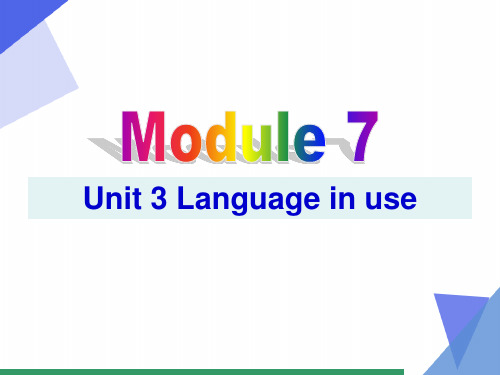
7. — _W__e_r_e__ your friends at your first school difficult. —No, theyw__e_r_en__’t_.
8. —__W__e_r_e_ you happy at your first
1. I was a good pupil in _p_r_i_m_a_r_y__s_ch__o_o_l _. 2. — Where _w__e_r_e_ you __b_o_r_n__?
— In Newton, a small __t_o_w_n__ inAmerica.
3. — Can I play a computer game, Mum? I _a_m__b_o_r_e_d_.
Lead in
Yao Ming Shanghai 1980
When was he born ? He was born in 1980. Where was he born ? He was born in Shanghai.
Luo Jin Jiangxi 1981 When was he born? He was born in 1981. Where was he born? He was born in Jiangxi.
3. — _W__a__s_ Daming born in Beijing. —Yes, he _w_a__s__.
4. —_W___er_e__ they at school on Monday? —No, they _w_e_r_e_n_’_t.
5. —_W___er_e__ they at home this morning? —No, they w__e_r_e_n_’_t.
外研版英语七年级下册Module 7Unit 3 Language in use 教案3
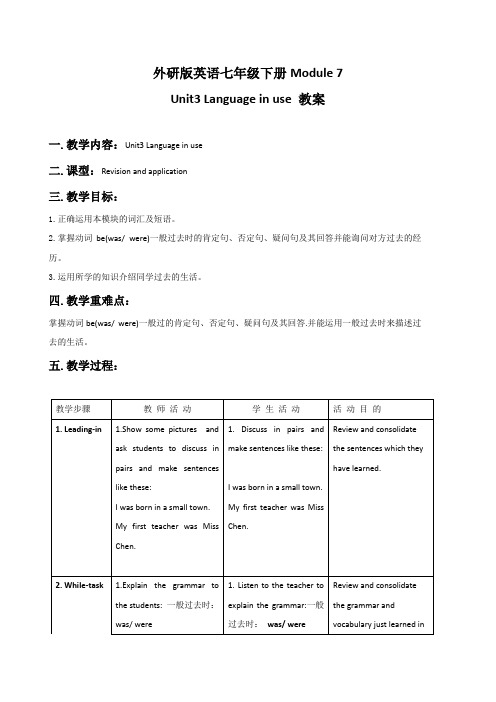
外研版英语七年级下册Module 7Unit3 Language in use 教案一.教学内容:Unit3 Language in use二.课型:Revision and application三.教学目标:1.正确运用本模块的词汇及短语。
2.掌握动词be(was/ were)一般过去时的肯定句、否定句、疑问句及其回答并能询问对方过去的经历。
3.运用所学的知识介绍同学过去的生活。
四.教学重难点:掌握动词be(was/ were)一般过的肯定句、否定句、疑问句及其回答.并能运用一般过去时来描述过去的生活。
五.教学过程:教学步骤教师活动学生活动活动目的1. Leading-in 1.Show some pictures andask students to discuss inpairs and make sentenceslike these:I was born in a small town.My first teacher was MissChen. 1. Discuss in pairs andmake sentences like these:I was born in a small town.My first teacher was MissChen.Review and consolidatethe sentences which theyhave learned.2. While-task 1.Explain the grammar tothe students: 一般过去时:was/ were 1. Listen to the teacher toexplain the grammar:一般过去时:was/ wereReview and consolidatethe grammar andvocabulary just learned in2. Let the students do Activity 3, then check the answers.3. Ask the students to work in pairs, ask and answer the questions about Liu Yun, themselves and their partner. ( Activity 1 and Activity2) 2. Do Activity3: Completethe sentences with thecorrect form of be.3. Work in pairs, ask andanswer the questionsabout Liu Yun, yourselvesand your partner. ( Activity1 and Activity2)the first two units.4. Ask the students to do Activity 4: Complete the sentences with the correct form of the word and expressions.5. Ask students to read “Around the world”, and then answer the questions after reading.Q1: What was Nelson Mandela?Q2: When and where was Nelson Mandela born?6. Check the answers. 4. Complete the sentenceswith the correct form ofthe word and expressions.5. Read “Around theworld”, and answer thequestions after reading.Q1: What was NelsonMandela?Q2: When and where wasNelson Mandela born?6. Show the answers.Review the words.Enlarge the knowledgeabout the world.3. Post-task 1. Ask students to work ingroups of six: Talk abouttheir classmate’s pat life..2. Ask the students to sayout their ideas.3. Let students do someexercises and then check. 1. Work in six:Talk about their idea of thepast.2. Say out the ideas.3. Do some exercises andthen check.To practice the skill ofspeaking.Practice the languagepoints.4. Summary Ask the students to say outwhat to learn. Students conclude theknowledge that they learn.Let the studentsinternalize the grammarthey’ve learned in thismodule.5.Homework Finish the workbook of Unit 3.。
外研版英语七年级下册Module 7 Unit 3《Language in use》课件
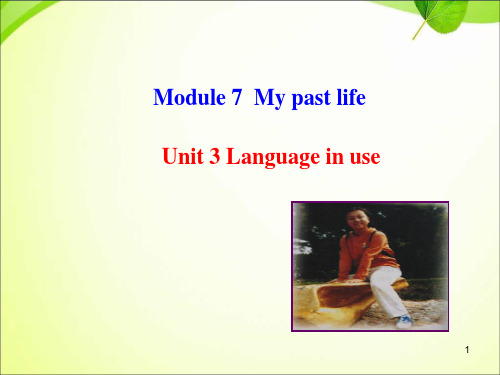
5. —_____ Were they at home this morning?
Module 7 My past life
Unit 3 Language in use
1
Revision
Language practice
I was born in a small village.
Tony wasn’t born in China.
Who were your first friends? She was strict. Were they difficult? Yes, they were./ No, they weren’t.
2
Choose and write.
1. My new friends _____ were (was/ were) born ___ in (in/ on) Beijing. 2. My parents _____ were (are/ were) in Hong Kong _______ in 1997 (in /on 1997). was (was/ were) a new pupil ___ on (in/ on) 3. Sam ____ September 1st.
9
跟踪小练习
Ⅰ.英汉词组互译 from … to … 1.从……到…… ________________ talk about 2.谈论…… ____________ the past life 3.过去的生活 _____________ on 18th July, 1918 4.在1918年7月18日 ______________________ write about 5.写关于…… _________________ 在一个小村子里 6.in a small village __________________ 南非总统 7.President of South Africa _________________ 一所小学 8.a primary school _______________ 听…… 9.listen to _____frica ___________________
七年级英语下册 Module 7 Unit 3 Language in use课件 (新版)外研版
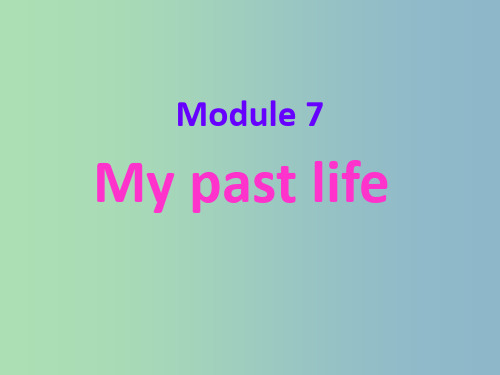
用were。例如: He was in a bank a moment ago. 刚才他在银行。
They were at KTV last night. 昨晚他们在KTV。 You were at home yesterday. 昨天你在家。
英语不同时态的最大的区别之一是动词的 变化。试比较:
This year is 2013. The twins are 4 years old. Last year was 2012. The twins were 3 years old. Next year will be 2014. The twins will be 5 years old.
I wasn’t in Grade Six last year. 我去年不是6年级。 Tony wasn’t a teacher two years ago. 托尼两年前不是老师。
一般疑问句及回答
把was/were提到句首, 句末用问号?即 可变为一般疑问句。即: Was / Were+主语+表语+其它? 若对一般疑问句做出回答, 肯定形式用: Yes, 主语+was / were. 否定形式用: No, 主语+wasn’t / weren’t.
e.g. Where / born? — Where was she born? — She was born in Tianjin. 1 what / primary school? 2 who / first teacher? 3 who / first friends?
一般疑问句及回答
把was/were提到句首, 句末用问号?即 可变为一般疑问句。即: Was / Were+主语+表语+其它? 若对一般疑问句做出回答, 肯定形式用: Yes, 主语+was / were. 否定形式用: No, 主语+wasn’t / weren’t.
外研社七下Module 7 Unit 3 Language in use

Fill in the blanks.
was born in a small village. 1. I ______
wasn’t 2. Tony _________born in China.
were your first friends? 3. Who ______ was strict. 4. She _______ Were they naughty? 5. _______ weren’t . were / No, they_______ 6. Yes, they ______.
4. We were in Dalian in 2003.
(对划线部分提问) When were you in Dalian? ______________
5. The girl was born in a small village.
(对划线部分提问) Where was the girl ______? born __________
Hale Waihona Puke Read and answer.
1.Where was he born? He was born in a small village in the Transkei region of South Africa.
2.When was he born?
He was born on 18th July, 1918.
1. Where were you born? 2. When were you born?
3. What was your first school?
4. What was the name of your first teacher?
5. What was he / she like?
外研版英语七年级下册Module 7Unit 3 Language in use 教案4
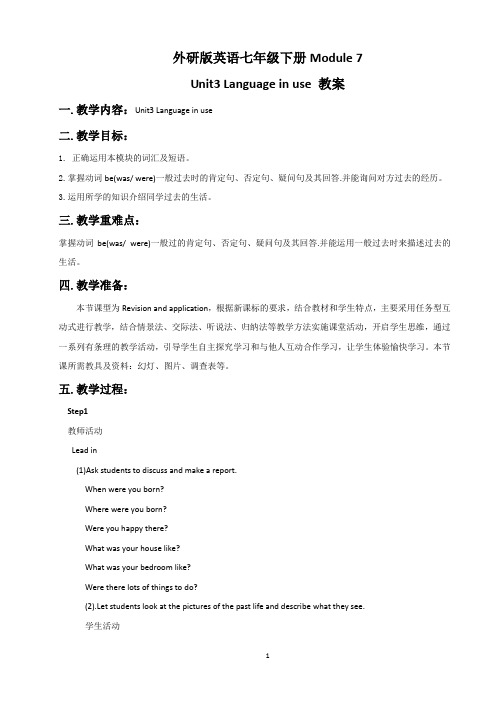
外研版英语七年级下册Module 7Unit3 Language in use 教案一.教学内容:Unit3 Language in use二.教学目标:1. 正确运用本模块的词汇及短语。
2.掌握动词be(was/ were)一般过去时的肯定句、否定句、疑问句及其回答.并能询问对方过去的经历。
3.运用所学的知识介绍同学过去的生活。
三.教学重难点:掌握动词be(was/ were)一般过的肯定句、否定句、疑问句及其回答.并能运用一般过去时来描述过去的生活。
四.教学准备:本节课型为Revision and application,根据新课标的要求,结合教材和学生特点,主要采用任务型互动式进行教学,结合情景法、交际法、听说法、归纳法等教学方法实施课堂活动,开启学生思维,通过一系列有条理的教学活动,引导学生自主探究学习和与他人互动合作学习,让学生体验愉快学习。
本节课所需教具及资料:幻灯、图片、调查表等。
五.教学过程:Step1教师活动Lead in(1)Ask students to discuss and make a report.When were you born?Where were you born?Were you happy there?What was your house like?What was your bedroom like?Were there lots of things to do?(2).Let students look at the pictures of the past life and describe what they see.学生活动(1)To discuss and make a report(2).Look at the pictures and describe.通过讨论引导学生回顾上节课的内容,巩固一般将来时的语法知识。
通过这个环节,既可以活跃课堂气氛,.也能从说句子中考验学生对Unit1知识的掌握程度,还训练了学生的反应。
最新外研版七年级英语下册 Module 7 Unit 3 Language in use教案
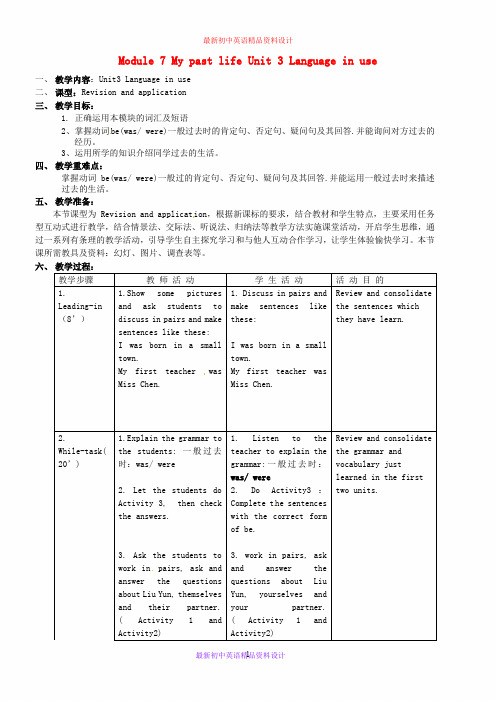
Module 7 My past life Unit 3 Language in use一、教学内容:Unit3 Language in use二、课型:Revision and application三、教学目标:1. 正确运用本模块的词汇及短语2、掌握动词be(was/ were)一般过去时的肯定句、否定句、疑问句及其回答.并能询问对方过去的经历。
3、运用所学的知识介绍同学过去的生活。
四、教学重难点:掌握动词be(was/ were)一般过的肯定句、否定句、疑问句及其回答.并能运用一般过去时来描述过去的生活。
五、教学准备:本节课型为Revision and applicat ion,根据新课标的要求,结合教材和学生特点,主要采用任务型互动式进行教学,结合情景法、交际法、听说法、归纳法等教学方法实施课堂活动,开启学生思维,通过一系列有条理的教学活动,引导学生自主探究学习和与他人互动合作学习,让学生体验愉快学习。
本节课所需教具及资料:幻灯、图片、调查表等。
六、教学过程:教学步骤教师活动学生活动活动目的1. Leading-in (8’)1.Show some picturesand ask students todiscuss in pairs and makesentences like these:I was born in a smalltown.My first teacher wasMiss Chen.1. Discuss in pairs andmake sentences likethese:I was born in a smalltown.My first teacher wasMiss Chen.Review and consolidatethe sentences whichthey have learn.2.While-task( 20’)1.Explain the grammar tothe students: 一般过去时:was/ were2. Let the students doActivity 3, then checkthe answers.3. Ask the students towork in pairs, ask andanswer the questionsabout Liu Yun, themselvesand their partner.( Activity 1 andActivity2)1. Listen to theteacher to explain thegrammar:一般过去时:was/ were2. Do Activity3:Complete t he sentenceswith the correct formof be.3. work in pairs, askand answer thequestions about LiuYun, yourselves andyour partner.( Activity 1 andActivity2)Review and consolidatethe grammar andvocabulary justlearned in the firsttwo units.4. Ask the students to do Activity 4: Complete the sentences with the correct form of the word and expressions.5. Ask students to read “Around the world”, and then answer the questions after reading.Q1:What was Nelson Mandela?Q2: When and where was Nelson Mandela born?6. Check the answers. 4. Complete thesentences with thecorrect form of theword and expressions.5. Read “Around theworld”, and answer thequestions afterreading.Q1:What was NelsonMandela?Q2: When and where wasNelson Mandela born?6. Show the answers.Review the words.Enlarge the knowledgeabout the world.3. Post-task (10’)1.Ask students to work ing roups of six: Talk abouttheir classmate’s patlife..2.Ask the students to sayout their ideas.3.Let students do someexercises and then check.1.Work in six:Talk about their ideaof the past.2.Say out the ideas.3. Do some exercisesand then check.To practice the skillof speaking.Practice the languagepoints.4. Summary (1’)Ask the students to sayout what to learn.Students conclude theknowledge that theylearn.Let the studentsinternalize thegrammar they’velearned in this module.5.Homework(1’)Finish the workbook of Unit 3.板书设计达标训练题一、单项选择。
外研版英语七年级下册《Module7 Unit 3 Language in use》教学设计
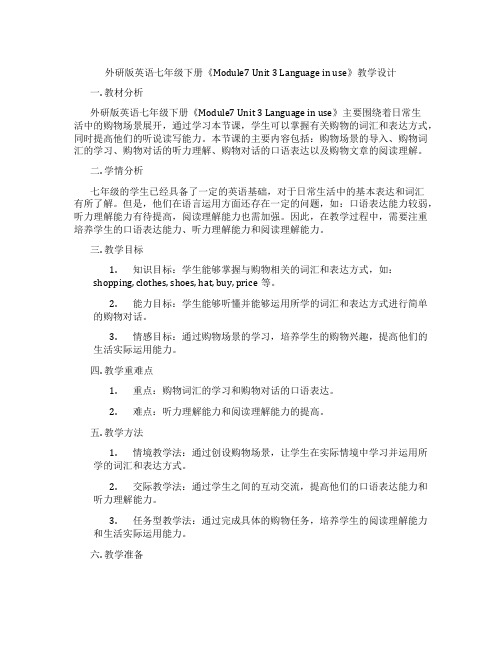
外研版英语七年级下册《Module7 Unit 3 Language in use》教学设计一. 教材分析外研版英语七年级下册《Module7 Unit 3 Language in use》主要围绕着日常生活中的购物场景展开,通过学习本节课,学生可以掌握有关购物的词汇和表达方式,同时提高他们的听说读写能力。
本节课的主要内容包括:购物场景的导入、购物词汇的学习、购物对话的听力理解、购物对话的口语表达以及购物文章的阅读理解。
二. 学情分析七年级的学生已经具备了一定的英语基础,对于日常生活中的基本表达和词汇有所了解。
但是,他们在语言运用方面还存在一定的问题,如:口语表达能力较弱,听力理解能力有待提高,阅读理解能力也需加强。
因此,在教学过程中,需要注重培养学生的口语表达能力、听力理解能力和阅读理解能力。
三. 教学目标1.知识目标:学生能够掌握与购物相关的词汇和表达方式,如:shopping, clothes, shoes, hat, buy, price等。
2.能力目标:学生能够听懂并能够运用所学的词汇和表达方式进行简单的购物对话。
3.情感目标:通过购物场景的学习,培养学生的购物兴趣,提高他们的生活实际运用能力。
四. 教学重难点1.重点:购物词汇的学习和购物对话的口语表达。
2.难点:听力理解能力和阅读理解能力的提高。
五. 教学方法1.情境教学法:通过创设购物场景,让学生在实际情境中学习并运用所学的词汇和表达方式。
2.交际教学法:通过学生之间的互动交流,提高他们的口语表达能力和听力理解能力。
3.任务型教学法:通过完成具体的购物任务,培养学生的阅读理解能力和生活实际运用能力。
六. 教学准备1.教师准备:准备好购物场景的相关图片、词汇卡片、录音机、磁带等教学用具。
2.学生准备:提前让学生预习本节课的内容,了解基本的购物词汇和表达方式。
七. 教学过程1.导入(5分钟)教师通过向学生展示购物场景的图片,引导学生进行观察和思考,激发他们的学习兴趣。
2020-2021学年外研版英语七年级下册Module7Unit3Languageinuse教案

1.理论介绍:首先,我们要了解收藏品的基本概念。收藏品是指个人或集体收集的具有一定价值、意义或美观性的物品。它可以是邮票、硬币、明信片等,反映了人们的兴趣爱好和文化追求。
2.案例分析:接下来,我们来看一个具体的案例。这个案例展示了一个同学如何用英语向他人介绍自己的邮票收藏,以及如何与他人交流收藏品的信息。
3.成果分享:每个小组将选择一名代表来分享他们的讨论成果。这些成果将被记录在黑板上或投影仪上,以便全班都能看到。
(五)总结回顾(用时5分钟)
今天的学习,我们了解了收藏品的基本概念和如何用英语介绍、交流收藏品。通过实践活动和小组讨论,我们加深了对这一知识点的理解。希望大家能够掌握这些知识点,并在日常生活中灵活运用。如果有任何疑问或不明白的地方,请随时向我提问。
-在构建句子时,学生可能不知道如何添加细节来丰富描述,如使用“which”引导的定语从句来进一步描述收藏品,例如:“I have a collection of stamps, which I have been collecting for three years.”
-口语交流中,学生可能不熟悉如何在对话中插入提问、回应和评论,需要教师提供交流模板和策略,如:“That’s an interesting item. How did you get it?”或“Where did you find this stamp? I have never seen one like it before.”
3.成果展示:每个小组将向全班展示他们的讨论成果和角色扮演活动。
(四)学生小组讨论(用时10分钟)
1.讨论主题:学生将围绕“如何用英语介绍和交流收藏品”这一主题展开讨论。他们将被鼓励提出自己的观点和想法,并与其他小组成员进行交流。
2021外研版英语七年级下册Module7Unit3《Languageinuse》word教案
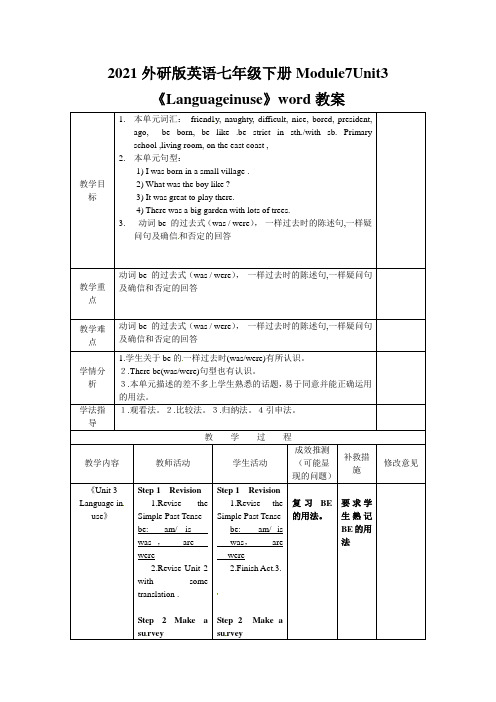
2021外研版英语七年级下册Module7Unit3《Languageinuse》word教案教学目标1.本单元词汇:friendly, naughty, difficult, nice, bored, president,ago,be born, be like .be strict in sth./with sb. Primary school ,living room, on the east coast ,2.本单元句型:1) I was born in a small village .2) What was the boy like ?3) It was great to play there.4) There was a big garden with lots of trees.3.动词be 的过去式(was / were),一样过去时的陈述句,一样疑问句及确信和否定的回答教学重点动词be 的过去式(was / were),一样过去时的陈述句,一样疑问句及确信和否定的回答教学难点动词be 的过去式(was / were),一样过去时的陈述句,一样疑问句及确信和否定的回答学情分析1.学生关于be的一样过去时(was/were)有所认识。
2.There be(was/were)句型也有认识。
3.本单元描述的差不多上学生熟悉的话题,易于同意并能正确运用的用法。
学法指导1.观看法。
2.比较法。
3.归纳法。
4引申法。
教学过程教学内容教师活动学生活动成效推测(可能显现的问题)补救措施修改意见《Unit 3 Language inuse》Step 1 Revision1.Revise theSimple Past Tensebe: am/ is ---was ,are ---were2.Revise Unit 2with sometranslation .Step 2 Make asu rveyStep 1 Revision1.Revise theSimple Past Tensebe: am/ is--- was,are--- were2.Finish Act.3.Step 2 Make asu rvey复习BE的用法。
外研版七年级英语下册Module7Unit3Languageinuse教案
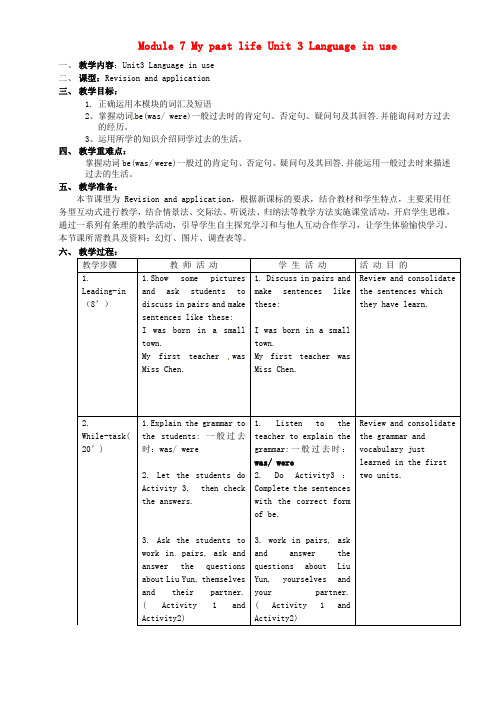
Module 7 My past life Unit 3 Language in use一、教学内容:Unit3 Language in use二、课型:Revision and application三、教学目标:1. 正确运用本模块的词汇及短语2、掌握动词be(was/ were)一般过去时的肯定句、否定句、疑问句及其回答.并能询问对方过去的经历。
3、运用所学的知识介绍同学过去的生活。
四、教学重难点:掌握动词be(was/ were)一般过的肯定句、否定句、疑问句及其回答.并能运用一般过去时来描述过去的生活。
五、教学准备:本节课型为Revision and applicat ion,根据新课标的要求,结合教材和学生特点,主要采用任务型互动式进行教学,结合情景法、交际法、听说法、归纳法等教学方法实施课堂活动,开启学生思维,通过一系列有条理的教学活动,引导学生自主探究学习和与他人互动合作学习,让学生体验愉快学习。
本节课所需教具及资料:幻灯、图片、调查表等。
教学步骤教师活动学生活动活动目的1. Leading-in (8’)1.Show some picturesand ask students todiscuss in pairs and makesentences like these:I was born in a smalltown.My first teacher wasMiss Chen.1. Discuss in pairs andmake sentences likethese:I was born in a smalltown.My first teacher wasMiss Chen.Review and consolidatethe sentences whichthey have learn.2.While-task( 20’)1.Explain the grammar tothe students: 一般过去时:was/ were2. Let the students doActivity 3, then checkthe answers.3. Ask the students towork in pairs, ask andanswer the questionsabout Liu Yun, themselvesand their partner.( Activity 1 andActivity2)1. Listen to theteacher to explain thegrammar:一般过去时:was/ were2. Do Activity3:Complete t he sentenceswith the correct formof be.3. work in pairs, askand answer thequestions about LiuYun, yourselves andyour partner.( Activity 1 andActivity2)Review and consolidatethe grammar andvocabulary justlearned in the firsttwo units.4. Ask the students to do Activity 4: Complete the sentences with the correct form of the word and expressions.5. Ask students to read “Around the world”, and then answer the questions after reading.Q1:What was Nelson Mandela?Q2: When and where was Nelson Mandela born?6. Check the answers. 4. Complete thesentences with thecorrect form of theword and expressions.5. Read “Around theworld”, and answer thequestions afterreading.Q1:What was NelsonMandela?Q2: When and where wasNelson Mandela born?6. Show the answers.Review the words.Enlarge the knowledgeabout the world.3. Post-task (10’)1.Ask students to work ing roups of six: Talk abouttheir classmate’s patlife..2.Ask the students to sayout their ideas.3.Let students do someexercises and then check.1.Work in six:Talk about their ideaof the past.2.Say out the ideas.3. Do some exercisesand then check.To practice the skillof speaking.Practice the languagepoints.4. Summary (1’)Ask the students to sayout what to learn.Students conclude theknowledge that theylearn.Let the studentsinternalize thegrammar they’velearned in this module.5.Homework(1’)Finish the workbook of Unit 3.板书设计达标训练题一、单项选择。
外研版英语七年级下册《Module7 Unit 3 Language in use》教学设计1
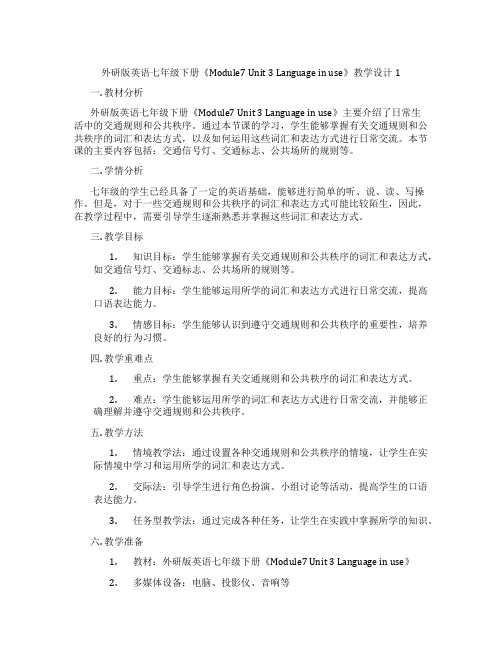
外研版英语七年级下册《Module7 Unit 3 Language in use》教学设计1一. 教材分析外研版英语七年级下册《Module7 Unit 3 Language in use》主要介绍了日常生活中的交通规则和公共秩序。
通过本节课的学习,学生能够掌握有关交通规则和公共秩序的词汇和表达方式,以及如何运用这些词汇和表达方式进行日常交流。
本节课的主要内容包括:交通信号灯、交通标志、公共场所的规则等。
二. 学情分析七年级的学生已经具备了一定的英语基础,能够进行简单的听、说、读、写操作。
但是,对于一些交通规则和公共秩序的词汇和表达方式可能比较陌生,因此,在教学过程中,需要引导学生逐渐熟悉并掌握这些词汇和表达方式。
三. 教学目标1.知识目标:学生能够掌握有关交通规则和公共秩序的词汇和表达方式,如交通信号灯、交通标志、公共场所的规则等。
2.能力目标:学生能够运用所学的词汇和表达方式进行日常交流,提高口语表达能力。
3.情感目标:学生能够认识到遵守交通规则和公共秩序的重要性,培养良好的行为习惯。
四. 教学重难点1.重点:学生能够掌握有关交通规则和公共秩序的词汇和表达方式。
2.难点:学生能够运用所学的词汇和表达方式进行日常交流,并能够正确理解并遵守交通规则和公共秩序。
五. 教学方法1.情境教学法:通过设置各种交通规则和公共秩序的情境,让学生在实际情境中学习和运用所学的词汇和表达方式。
2.交际法:引导学生进行角色扮演、小组讨论等活动,提高学生的口语表达能力。
3.任务型教学法:通过完成各种任务,让学生在实践中掌握所学的知识。
六. 教学准备1.教材:外研版英语七年级下册《Module7 Unit 3 Language in use》2.多媒体设备:电脑、投影仪、音响等3.教学道具:交通信号灯、交通标志等4.课件:根据教学内容制作的课件七. 教学过程1.导入(5分钟)教师通过向学生展示一些交通信号灯和交通标志的图片,引导学生谈论交通规则和公共秩序,激发学生的学习兴趣。
【课件】初中英语七年级下册Module 7《Unit 3 Language in use》课件ppt
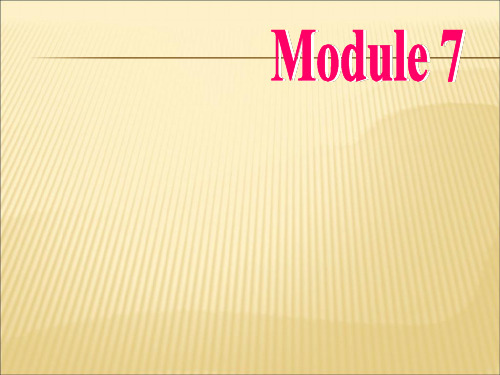
—YesW, sheere______.
7. — _______ your friends at your first
school diffiwcuelrt.en’t —NoW, theerye _______.
一般过去时 一般过去时表示过去某个时间里发生的 动作或状态;过去习惯性、经常性的动 作、行为。
动词 be 的过去时的基本结构: 肯定:主语 + was/were + 其他; 否定:主语 + was/were + not + 其他; 一般疑问:were/was + 主语 + 其他。
be 动词的过去式
3. — Can I play a computer game, Mum? I _a_m__b_o_r_e_d__.
— You can read your book.
4. Qingdao is in Shandong Province and it is o_n__t_h_e_e_a_s_t_c_o_a_s_t_o_f_ China.
3. — _W__a_s__ D, he __w_a_s__.
4. —_W__e_r_e__ they at school on Monday? —No, theyw__e_r_en__’t_.
Were 5. —_______ thweyeraetnh’tome this morning?
primary school town
1. I was a good pupil in _p_r_i_m_a_r_y__s_c_h_o_o_l _. 2. —Where __w__e_r_e_ you __b_o_r_n__?
最新外研版英语七年级下册module7《unit 3 language in use》教案.doc
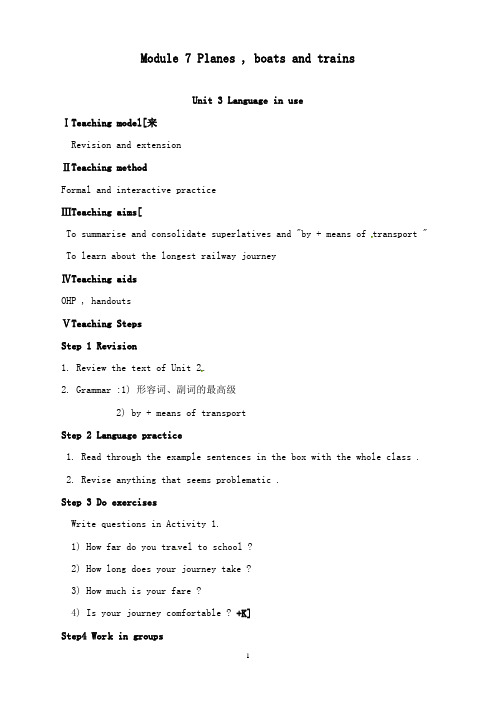
Module 7 Planes , boats and trainsUnit 3 Language in useⅠTeaching model[来Revision and extensionⅡTeaching methodFormal and interactive practiceⅢTeaching aims[To summarise and consolidate superlatives and "by + means of transport " To learn about the longest railway journeyⅣTeaching aidsOHP , handoutsⅤTeaching StepsStep 1 Revision1. Review the text of Unit2.2. Grammar :1) 形容词、副词的最高级2) by + means of transportStep 2 Language practice1. Read through the example sentences in the box with the whole class .2. Revise anything that seems problematic .Step 3 Do exercisesWrite questions in Activity 1.1) How far do you tra vel to school ?2) How long does your journey take ?3) How much is your fare ?4) Is your journey comfortable ? +K]Step4 Wor k in groups1. Answer the questions in Activity 1.2. Ask and answer the questions in Activity 3 .Step 5 Do exercises[1. Complete the word map. Use these words in Acti vity 4 .2. Complete the sentences with correct form of the adjectives in Activity 5.Step 6 Around the world1. Ask the students to look at the pi cture and tell what they can see .2. Read the text and answer any questions the students have .Step 7 Module task : Interpreting data1. Work in pair. Answer the questions according to the tab le in Activity 6 .1) How comfortable is the journey from Beijing to Jinan by plane / by train / by bus?2) How popular is the journey from Beijing to Jinan by plane / by train / by bus?2. Talk about the journey from Beijing to Jinan in Activity 7 .Step 7 HomeworkFinish the exercise in the workbook Ex.7, 8 , 9 &10。
Module+7++Unit+3++Language+in+use 外研版英语七年级下册
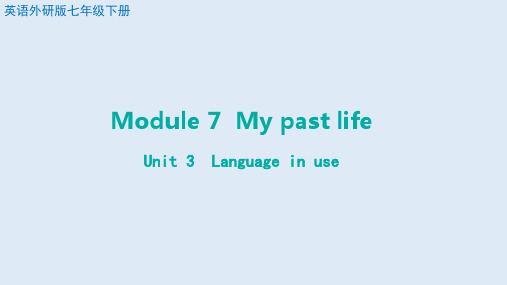
Module 7 My past life
Unit 3 Language in use
语法归纳
【注意】 There be句型的一般过去式: (1)肯定式:There+was/were+主语+其他. There was a shop here last year.去年这里有一家商店。 There were two bedrooms in the house.这个房子有两间卧室。 (2)否定式:There+ wasn't/weren't+主语+其他. There weren't two bedrooms in the house.这个房子没有两间卧室。
Mo Yan's winning of the Nobel Prize in Literature is a great encouragement for China's literature and brings more confidence(自信) to the nation's young writers.
——我在图书馆。 — I was in the library.
3. 他过去又矮又瘦,但是现在他又高又壮。 He was short and thin in the past, but now he is tall and strong.
4. 我上一次在这里是在2019年4月。 The last time I was here was in April, 2019.
A. were; are
B. are; were
C. was; are
D. were; were
( D )3.There an interesting movie last night.Did you watch it?
- 1、下载文档前请自行甄别文档内容的完整性,平台不提供额外的编辑、内容补充、找答案等附加服务。
- 2、"仅部分预览"的文档,不可在线预览部分如存在完整性等问题,可反馈申请退款(可完整预览的文档不适用该条件!)。
- 3、如文档侵犯您的权益,请联系客服反馈,我们会尽快为您处理(人工客服工作时间:9:00-18:30)。
内蒙古鄂尔多斯市东胜区培正中学七年级英语下册 Module7 Unit 3 Language in use 练习题(无答案)人教新目标版预习导航
翻译下列短语1. 小学 2. 出生 3. 在东海岸
4. 在电影院
翻译下列句子
我出生在昆西。
I ______ _______ ______Quincy.
1.我的第一个老师是莱恩老师。
My _____ _____ _____ Mrs Lane.
2.我不厌倦昆西。
I ________ ________in Quincy
3.你也课上困难吗? _____ ______ _____ in class too?
4.你在哪儿出生?_____ _____ ______ born?
一.单项选择
1. Would you like something to _____? Yes, please. A storybook
A. eat
B. drink
C. wash
D. read
2. He was born ____ May, 1998
A. in
B. on
C. at
D.for
3. Our teachers are always very _____ with students in the study.
A. friend
B. successful
C. interested
D. s trict
4. What did you see on the desk then? There ______ two bottles of ora nges.
A. was
B. were C, had D. has
5. There ______ something wrong with my bike.
A. is
B. was
C. are
D. w ere
6. What did you do after school yesterday? I _______ basketball with my friends
A. play
B. pl ayed
C. will play
D. am playing
7. We often cook in the ______
A. bedroom
B. living room
C. kitchen
D. garden
8. She often comes into the classroom _____ a smile on her face.
A. has
B. have
C. with
D. of
9. Betty is looking forward to ______ to China.
A. come
B. coming
C. comes
D. comeing
10. Was Ms Li your English teacher last year? No, _____
A. he wasn’t
B. she wasn’t
C. she was
D. he was
二.句型转换
1. There were some people in the park yesterday.(改为否定句)
There ______ _____ people in the park yesterday
2. She was at home l ast night.(改为一般疑问句)
_____ _____ at home last night?
3. He was born in a small village.(对划线部分提问)
_____ ____ ____ born?
4. She has a garden. There are some trees in the garden.(合并为一句)
She has a garden _____ _____ _____ _____ ______.
5.They were at school yesterday.(对划线部分提问)
_____ _____ they yesterday?
三.用所给词的适当形式填空
get, want, take, go, be
Three months ago, Mike _____ seven years old and began to go to school. One Sunday, his mother Mrs Smith didn’t go to work and Mike ______ to go to the zoo. So he ______ up early and ask his mother ______ him there. After breakfast they _____ to the bus stop. They wanted to take No.3 bus to the zoo.
四.选择适当的答语。
1. Was Mary born in China? A. I was born in Shangha i.
2. Were your friends difficult? B. Yes, he was.
3.Was Li Fei friendly or unfriendly? C. They were friendly.
4.Who was your first teacher? D. No, she wasn’t
5.Where were you born? E. Cambridge Primary School
6. Was Tom your good friend? F. He was friendly
7.What wer e your friends like? G: Yes, I was
8.What was the name of the school? H: He was born in Beijing
9.Were you a teacher last year? I: Ms Liu Ping
10.Where was Yuan Longping born? J: No, they weren’t
五.任务型阅读
Mr Turner is standing near the window. His wife , Mrs Turner, is sitting behind him.
She is reading a book. She closes the bok and asks her husband, “What are you looking at?”“I’m looking at the boy,” Mr Turner answers. “He’s under the tree near our house. He’s standing by my bike.”
“Oh,”Mrs Turner says, “ what is he doing now?”
“He’s cleaning the seat, “ says Mr Turner. “Now he is riding my bike.”
Mrs Turner looks out of the window and then she says,”Ah, don’t you know who he is? He is our son! He is going to school. You must wear glasses!”
1.Where is Mr Turner standing?
2.Is Mrs Turner sitting or standing?
3.What’s Mr Turner looking at?
4.Where’s Mr Turner’s bike?
5.Why is the boy riding the bike?。
